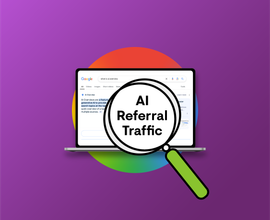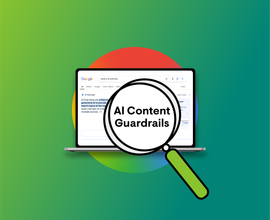Holiday SEO Strategy: Best Practices and Common Mistakes
When done right, holiday or seasonal SEO can be a significant driver of increased traffic, conversions, and revenue for eCommerce companies during the holiday shopping surge.
Here are the core do’s and don’ts to crafting a successful strategy:
DO:
- Publish and optimize all holiday content as early as possible.
- Rely on keyword research and competitor analysis to inform your holiday content.
- Speak to the current year and relevant trends in your holiday SEO content.
- Ensure all holiday content and pages follow technical SEO best practices.
DON’T:
- Include the year in your holiday content URLs.
- Sacrifice performance for style.
- Repeat last year’s mistakes.
The leaves are beginning to change, the air is cool and crisp, and schools are back in full swing. That can only mean one thing for SEOs: it’s time to ensure your website is optimized and ready for the holiday eCommerce rush.
The holiday season (AKA October, November, December) is the most important time of year for eCommerce sites. Case in point: According to Adobe Analytics, consumers spent $11.3B on Cyber Monday in 2022 , breaking previous records for the online-only shopping holiday. In total, consumers spent $35.3B across Cyber Week (the period including Thanksgiving, Black Friday, and Cyber Monday) in 2022, a 4% YoY increase .
But with added customer interest comes added competitionCompetition
Businesses generally know who their competitors are on the open market. But are they the same companies you need to fight to get the best placement for your website? Not necessarily!
Learn more. Get ahead—and stay ahead—of your competition with these holiday SEO best practices and find out a few common mistakes to avoid.
Cyber Monday and Black Friday SEO: Top tips to maximize success
1. Publish and optimize all holiday content before November
The best time to create and publish new holiday content for Black Friday or Cyber Monday is as early as possible in the year. The second best time is right now, and definitely before November starts. Google needs time to find, crawl, index, and rank your holiday content, and there’s no way to predict when Google will do that for your site. You want to give Google at least a few weeks to complete that process for your pages.
You should also give yourself time to make additional optimizations post-publishing to ensure your holiday SEO content ranks well before the spike in search volumeSearch Volume
Search volume refers to the number of search queries for a specific keyword in search engines such as Google.
Learn more and traffic hits. The goal is to provide your relevant holiday content with enough time to develop authority and secure top search results and rich result types before everyone starts searching for it en masse.
If competing priorities put you behind on publishing Cyber Monday or Black Friday SEO efforts until November or December, don’t panic. You still want to publish and optimize your holiday content now. At the very least, that content can gain authority and give you a head start over the competition next year.
For Conductor customers:
The new Writing Assistant feature in Conductor empowers you and your team to optimize your content as you write, providing clarity, relevance, and on-page recommendations based on Google’s top 15 ranking pages for the provided topic to improve your content’s ranking potential.
2. Rely on keyword research and competitor analysis to inform your SEO strategy
Like any piece of content you want to rank organically, keyword research is the best way to identify the elements and content to optimize that will drive potential customers to your site and convert them into actual customers. Research the monthly search volume (MSV) for relevant keywords for your eCommerce vertical and evaluate the level of competition and investment required to rank in the top 10 search results.
Here are two primary holiday-specific SEO factors to consider when researching keywords:
- If you want to include the year in your target keywordKeyword
A keyword is what users write into a search engine when they want to find something specific.
Learn more, use the previous year in your research to gauge MSV. Keywords with the current year will show minimal search volume because most searches for that keyword will happen in the future during the related holiday season.
*Similarly, if you have a new product or there’s an emerging trend in your space, the available MSV for those keywords won’t provide an accurate picture. Instead, use your industry knowledge to make an informed decision. - Focus on keywords that are realistic for your business to rank for. Every eCommerce site or online publisher has a “Holiday Gift Guide” or “Best Holiday Gifts for This Year” page. But for most “gift guide” and “best gifts” keywords, Google tends to prioritize and rank pages only from third-party sites or sites that sell multiple products across multiple brands. If that doesn’t sound like your business, then it’s best to ignore the tempting search volume of those keywords. Choose a target keyword more specific to your business and content where you have a higher chance of breaking into the top 10 search results.
From there, dive into competitor keyword research to make sure you choose keywords with the right intent. Not only does this help improve rankingsRankings
Rankings in SEO refers to a website’s position in the search engine results page.
Learn more on SERPs, but it also improves the quality of the traffic and leads you receive.
For Conductor customers:
Conductor’s Explorer feature has all of your keywordKeyword
A keyword is what users write into a search engine when they want to find something specific.
Learn more research needs covered, including expanded historical data to learn from last year’s trends and insights on your competition’s strengths and weaknesses.
3. Speak to the current year and relevant trends in your holiday SEO content
If you’re searching to buy holiday gifts online, you don’t want to see last year’s products, do you? The people searching for your products think the same way. Including the current year in your page title, description, headers, and body copy when appropriate signals to searchers that they’re looking for the most up-to-date products and makes it more likely that they’ll click through to your site from the search engineSearch Engine
A search engine is a website through which users can search internet content.
Learn more.
Including the current year in those elements will also help your page rank organically, whether or not the keyword searched contains the year. Additionally, including the current year also tells search engines that your content is fresh and more likely to be helpful to searchers, making search engines more likely to rank the content well.
For Conductor customers:
Use Writing Assistant to quickly see if the top rankers for your target keyword are using the current year in their pages’ elements. And if Google is already rewarding pages that do, you should also include it on your page. Writing Assistant also identifies critical optimization opportunities to implement so your content is ready for the holiday rush.
4. Ensure all holiday content is up to technical standards
The foundation for any successful SEO strategy is sound technical SEO. And if the holidays are important for your business, you’ll want to make sure your holiday pages are the best-performing pages on your site. In addition to the more obvious elements (like making sure your page is crawlable and indexable by Google), be sure to prioritize the following technical SEO elements:
- Page speed: The faster the page loads, the better the UX, and the more likely the page is to rank well because page speed is a significant ranking signal for search engines. (See this in action with 10 case studies proving the importance of page speed.)
- Schema markup: Schema allows you to feed Google’s crawler information about your page in its language (AKA code), which helps your page get crawled, indexed, and ranked more efficiently.
- Mobile friendliness: For eCommerce sites specifically, it’s critical to ensure your mobile experience is equal to, if not better than, your desktop experience. This is especially true if most of your website visits or revenue are from mobile users.
For Conductor customers:
- ContentKing (acquired by Conductor) allows you to monitor everything about your holiday SEO pages, including their speed, schema markups, and even the actual content on the page. And because ContentKing monitors your site 24/7, you can validate any changes or check for issues in real-time. Customers can access ContentKing via the Measure section of the main navigation in Conductor.
Common holiday SEO mistakes to avoid
1. Including the year in your holiday content URLs
Including the year in the URLs for holiday-specific content is one of the most common holiday SEO mistakes. Effective holiday content should be evergreen, meaning it lives on your site indefinitely to build up authority over time (accounting for regular optimizations, of course). By using the same evergreen URL and updating the content on the page every year, you can maximize the authority and SERP rankings you’ve already earned.
If you include the year in the URL of your holiday content, you would have to create an entirely new page with a unique URL every year and redirect the previous year’s URL to the new page. This will build a lengthy redirect chain, which could dilute the organic authority the page has built up and result in decreased rankings on SERPs. Benefit from the hard work you put in last year by selecting a URL hyperfocused on the target keyword the first time around and only including the year in the content, which you can easily swap out with each year.
2. Sacrificing performance for style
Your team was on top of planning all year and has an amazing holiday video ready to include on your holiday-related landing page. You want that video to gain the most exposure possible, so you’re considering replacing the hero image on your page with the video and having it auto-play when the page loads. Makes sense, right?
Stylistically, it does. But performance-wise, that video will slow the loading time of the whole page. Plus, hero videos often don’t translate well to mobile.
If the video negatively impacts those two things, the page won’t rank as well, and the video will get less exposure because fewer people are finding the page. Instead, move that video ‘below the fold,’ meaning it requires the user to scroll down on the page to see it.
The rest of that page will load faster using this strategic page loading strategy. By the time the user scrolls to the video, it will be ready to play without impacting the page’s overall performance and lead to more people viewing your video.
3. Repeating last year’s mistakes
Your SEO strategy isn’t going to be a home run every time, but the only way an unsuccessful SEO strategy becomes a failure is if you don’t learn from it. Your eCommerce site needs an updated holiday SEO strategy every year, which means each year is a chance for you to improve.
Did you publish holiday content late last year? Make it a goal to get all of your holiday pages published and optimized before September ends the following year. Were you not able to rank for your target keywords last holiday season? Dedicate more time to identifying and researching target keywords that better align with your content. Did your holiday blogs outperform your holiday product pages last year? Include featured products and links in this year’s blogs to better leverage that traffic and create a funnel for users to follow once they’re on your site.
‘Tis the season to sleigh your SEO holiday strategy
Developing an effective holiday or seasonal SEO strategy can be a game-changer for eCommerce websites. Implement these best practices to boost your online visibility, tap into the shopping frenzy, and watch your organic traffic skyrocket during major holidays like Black Friday and Cyber Monday. But remember that implementing these best practices is just as important as avoiding common holiday SEO mistakes.







